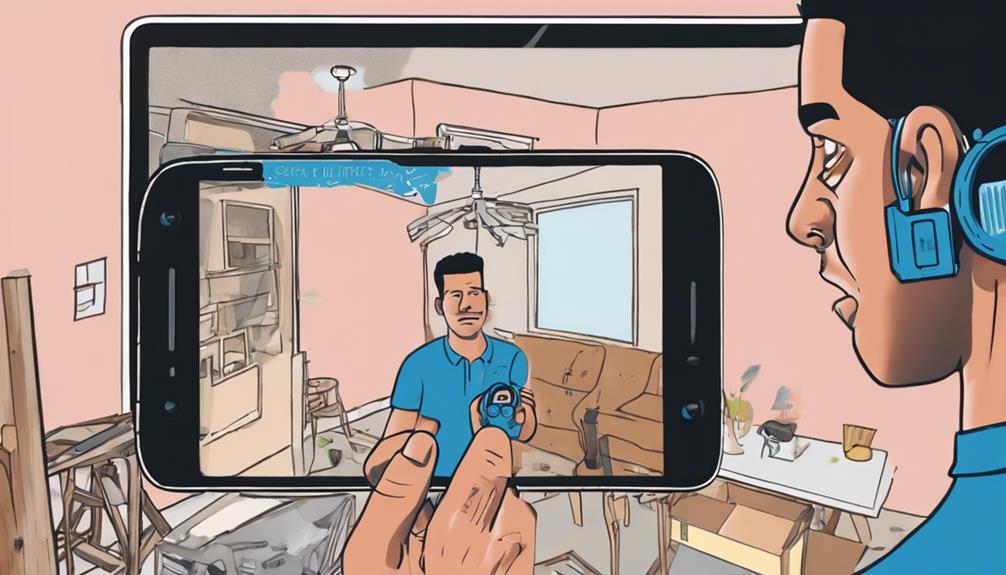Installing a security system yourself can save you a lot of money and offer custom options tailored to your needs. You'll have full control over installation and placement, allowing for flexibility. However, you'll face technical challenges like compatibility issues and proper placement, which can be frustrating and time-consuming. You'll also be responsible for regular maintenance, such as testing and updates. On the flip side, professional installation guarantees ideal coverage and ongoing support. Weighing the pros and cons will help you decide what's best for your home security. Continue on to discover more insights into each aspect.
Key Takeaways
- DIY installation saves money by avoiding professional fees and labor costs.
- Customization allows specific tailoring of the system to fit personal needs and preferences.
- Installation scheduling is flexible, accommodating busy lifestyles without waiting for technicians.
- Technical challenges such as compatibility issues and network configuration may arise during DIY installation.
- Maintenance responsibility, including regular testing and updates, falls entirely on the homeowner.
Cost Savings
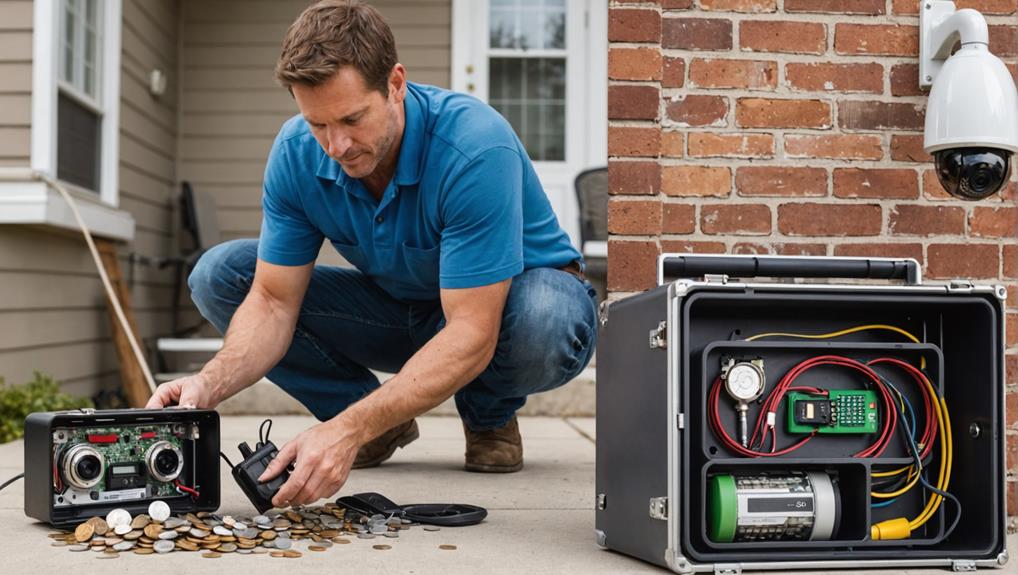
One of the biggest advantages of installing a security system yourself is the significant cost savings. By opting for a self-install security system, you avoid hefty installation fees charged by professional services. According to a detailed analysis of the costs, DIY security systems are often much cheaper because you're not paying for labor.
The cost of DIY security is often much lower because you're not paying for labor. This means you can allocate more of your budget to higher-quality equipment or additional features that enhance the safety of those you serve.
When you choose DIY security installation, you're not just saving money; you're also gaining the flexibility to install the system at your own pace. With straightforward instructions and user-friendly components, most self-install security systems are designed to be accessible, even if you're not particularly tech-savvy.
This allows you to focus your resources and efforts on protecting and serving your community effectively.
Moreover, the cost savings from a DIY security system can be reinvested into other areas that benefit those you care about. Whether it's funding community programs or improving other aspects of your home or business, the money saved can make a meaningful difference.
Customization Options
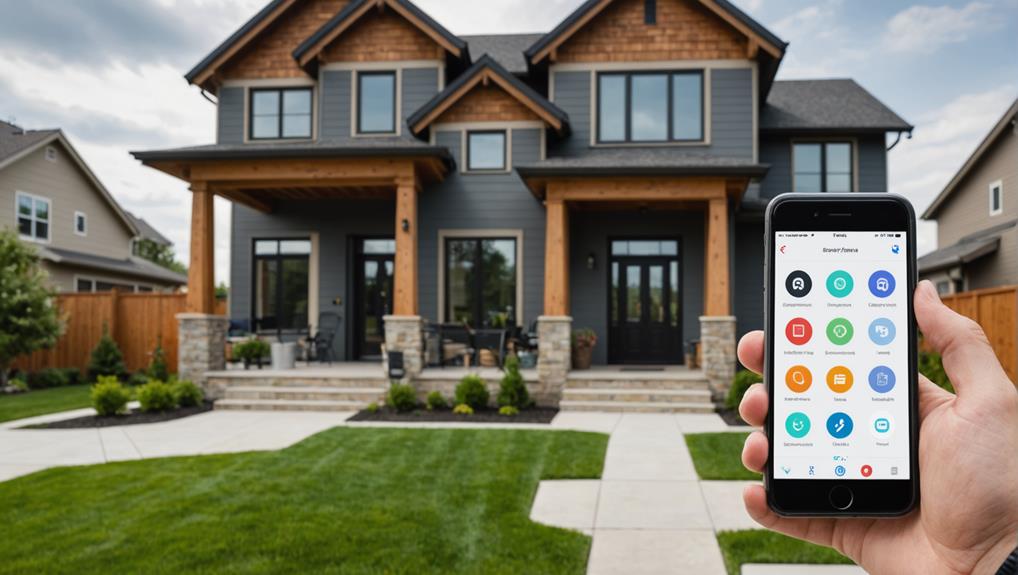
When you install a security system yourself, you can tailor it to your specific needs and preferences.
You have the freedom to choose the components that best fit your home and lifestyle. This means you can mix and match sensors, cameras, and alarms to create a system that's perfect for you.
Additionally, by avoiding common mistakes, you can guarantee your system operates efficiently and effectively, providing you with peace of mind.
Tailor to Your Needs
Customizing your security system is essential to confirm it meets your unique needs and lifestyle. When you handle the home security setup yourself, you get the freedom to tailor every aspect to suit your requirements. This can be incredibly beneficial, especially if you want to guarantee the safety of those you care about.
However, there are both pros and cons of DIY security. On the positive side, you have complete control over the placement and functionality of each component, allowing you to focus on areas that matter most to you.
But, the challenges of DIY installation can't be ignored. You might struggle with technical aspects or face difficulties confirming everything works seamlessly.
To help you navigate these challenges, consider these three customization tips:
- Assess Your Space: Evaluate your home's layout to determine where sensors and cameras will be most effective. This helps in covering all vulnerable points.
- Prioritize Key Areas: Focus on high-risk areas first, like entrances and ground-floor windows, to maximize security coverage.
- Incorporate Technology: Use smart home devices that integrate with your security system for added convenience and efficiency.
Component Selection Freedom
Choosing the right components for your security system gives you unparalleled freedom to customize it to your exact needs. When you install a security system yourself, you get to pick and choose each element based on what best serves your home and loved ones.
Unlike pre-packaged systems, a DIY approach allows you to cater to specific areas that need more attention, whether it's a discreet camera for your front porch or additional sensors for back windows.
You're in complete control, ensuring every component aligns with your priorities. For instance, if you have a loved one with mobility issues, you can focus on integrating accessibility-friendly devices.
Want to support your community by enhancing neighborhood watch efforts? You can add high-definition cameras that cover shared spaces.
Furthermore, you can upgrade individual parts as better technology becomes available, without overhauling the entire system.
This level of customization means you're not just installing a security system; you're creating a tailored solution that reflects your commitment to the safety and well-being of those you care about.
In the end, this personalized approach not only enhances security but also fosters a sense of peace and assurance.
Installation Control
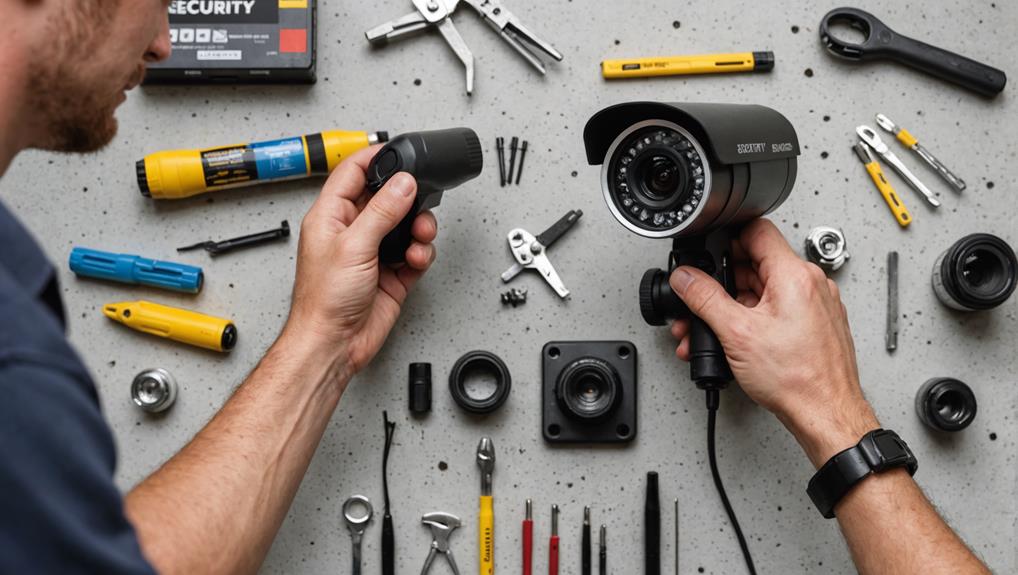
With installation control in your hands, you can customize the system to fit your exact preferences.
Another advantage is that DIY security systems often come with easy-to-follow instructions, making the setup process straightforward for most homeowners.
You're able to schedule the setup at your convenience, ensuring it suits your timetable. This flexibility means you won't have to wait on a technician's availability.
Customization to Preferences
Tailoring your security system to fit your specific needs not only enhances your peace of mind but also guarantees ideal functionality.
Installing a security system yourself allows you to customize it exactly to your preferences, ensuring it meets the unique requirements of your home or business. You can place cameras and sensors in the most strategic locations, set up alerts that matter most to you, and integrate smart home features if needed.
When you take control of the installation process, you can:
- Choose Equipment: Select the devices and brands that best suit your needs, from high-resolution cameras to motion sensors and alarm systems.
- Optimize Placement: Decide where each component should go for maximum coverage and effectiveness, ensuring no blind spots.
- Adjust Settings: Customize alert types, notification preferences, and system behaviors to align with your daily routine and safety concerns.
Flexible Scheduling
While customizing your security system to your preferences is essential, having control over the installation schedule adds another layer of convenience. When you install a security system yourself, you're in charge of when and how it gets done. This flexibility can be incredibly beneficial, especially for those with busy schedules or unpredictable commitments.
Self-Installation Benefits | Professional Installation Drawbacks | Flexible Scheduling Advantages
— | — | —
You decide the time | Waiting for availability | Fits your personal timetable
Work at your pace | Potential delays | Immediate action on security needs
No need for appointments | Inconvenient service hours | Customizable to unique schedules
By handling the installation yourself, you avoid the hassle of coordinating with a professional service. This flexibility allows you to work around your own schedule, ensuring that the installation process doesn't interfere with your daily responsibilities or obligations to others. It's particularly helpful if you're managing a household or running a business where your time is already stretched thin.
Ultimately, the ability to dictate your installation schedule empowers you to promptly address your security concerns. You can prioritize setting up protection when and where it's needed most, ensuring a safer environment for those you care about.
Technical Challenges
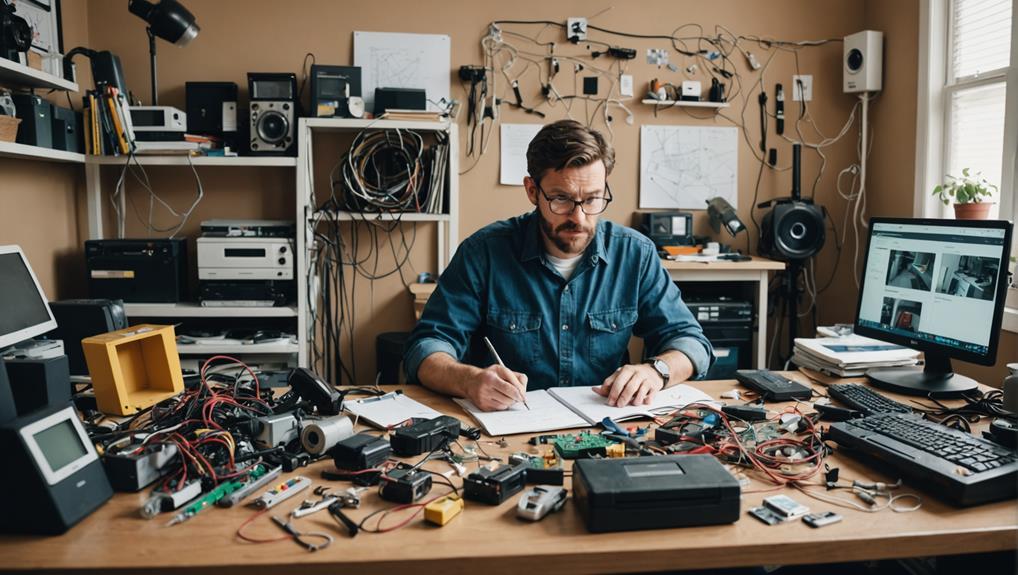
Installing a security system yourself can present several technical challenges that may test your patience and skill. When you take on this project, you might run into issues that require a bit more tech-savviness than you initially anticipated.
Here are a few common technical hurdles you may face:
1. Compatibility Issues: Ensuring that all components of your security system are compatible can be tricky. Different brands and models may not work seamlessly together, causing potential functionality issues.
This is a common challenge in DIY installations, where you mightn't have the expertise to troubleshoot these problems as effectively as a professional.
2. Network Configuration: Many modern security systems rely on your home network. You'll need to configure routers, set up firewalls, and possibly deal with IP addresses.
If you're not familiar with these tasks, you could find yourself in a frustrating situation.
3. Proper Placement: Positioning cameras and sensors efficiently is critical. Placing them incorrectly could result in blind spots or ineffective monitoring.
You'll need to understand the best angles and distances to cover all necessary areas.
Time Investment
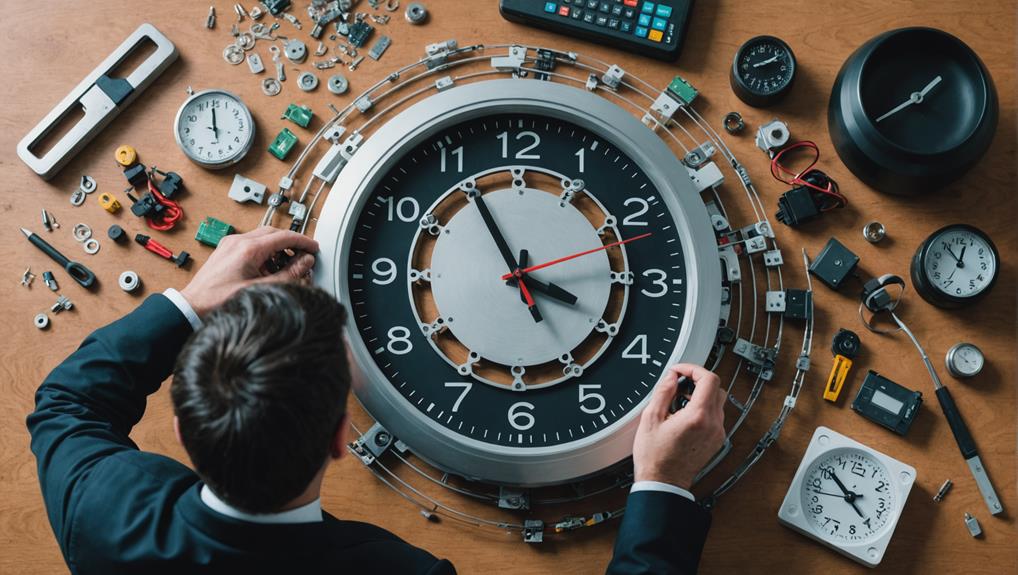
Taking on a DIY security system installation demands a significant time investment. You'll need to dedicate hours to research the right system, understand its components, and guarantee it meets your needs. Reading manuals, watching tutorial videos, and possibly consulting online forums will take up a good chunk of your time.
This is especially true if you want to do it right and guarantee your home or the home of someone you care about is truly secure.
Once you've gathered your information, the actual installation process can be quite time-consuming. You'll need to mount cameras, install sensors, and set up a central control panel. Each step requires careful attention to detail to avoid mistakes that could compromise the system's effectiveness.
Testing each component after installation is also essential, guaranteeing everything functions as expected.
If you're someone who enjoys serving others, you might find that the time investment is worth it. You'll gain a sense of accomplishment and the satisfaction of knowing you've contributed to the safety and well-being of those you care about.
However, be prepared to commit a significant amount of time to the project from start to finish.
Maintenance Responsibility
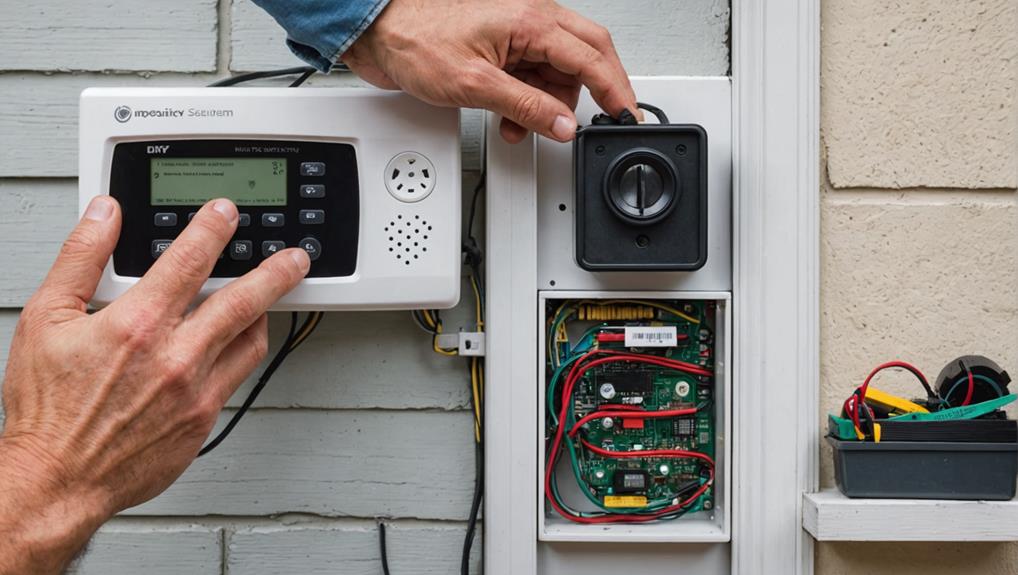
After dedicating time to researching and installing your DIY security system, it's important to understand the ongoing maintenance responsibilities you'll face.
Taking care of your system guarantees it continues to protect you and your loved ones effectively. By doing the maintenance yourself, you'll have complete control, but it also means you'll need to stay on top of it regularly.
To help keep your system strong, consider these essential tips for maintaining residential security systems, guaranteeing they remain functional and effective over time.
Here are three key maintenance tasks you should be prepared to handle:
- Regular Testing: Periodically test your system to guarantee all sensors, alarms, and cameras are functioning correctly. This helps catch any issues early and keeps your system reliable.
- Firmware Updates: Keep your system's software up to date. Manufacturers frequently release updates that improve functionality and address security vulnerabilities. Make a habit of checking for and installing these updates.
- Battery Replacement: Many components of your security system, such as sensors and cameras, rely on batteries. Regularly check and replace these batteries to avoid any lapses in protection.
Professional Assistance Benefits

Engaging professional assistance for your security system offers several notable advantages. First, professionals bring expertise and experience that guarantee your system is installed correctly and efficiently. They know the best locations for sensors and cameras, maximizing coverage and minimizing blind spots. This means you can focus on what you do best—helping others—without having to worry about potential security lapses.
Professional installation is particularly beneficial in complex setups where integrating multiple devices is vital for peak performance.
Additionally, professional installers often provide ongoing support and maintenance, so you won't be left troubleshooting issues alone. If something goes wrong, you can count on their prompt assistance, allowing you to maintain your focus on serving your community. Their support can be a lifesaver, especially in emergencies when every second counts.
Moreover, professionals can offer valuable advice on the latest security technology and tailor solutions to meet your specific needs. This personalized approach guarantees your system isn't only effective but also aligns perfectly with your goals of safety and service.
Frequently Asked Questions
How Does DIY Installation Impact the Resale Value of My Home?
DIY installation can impact your home's resale value positively or negatively.
When done well, it's a selling point that shows potential buyers your commitment to security.
However, if it's poorly installed, it may raise concerns.
To serve future homeowners, guarantee the system is properly set up and documented.
This attention to detail can help maintain or even boost your home's value, making it more appealing to buyers.
What Are the Warranty Implications for Self-Installed Security Systems?
When you install a security system yourself, you might void the warranty if not done correctly.
Many manufacturers require professional installation to maintain warranty coverage. Ensuring the system works properly is vital for protecting your home and loved ones.
Are There Insurance Benefits to Installing a Security System Myself?
Yes, there can be insurance benefits if you install a security system yourself.
Many insurance companies offer discounts for having a security system in place. You'll need to check with your provider to verify your DIY system meets their requirements.
Can a DIY System Integrate With Smart Home Devices?
Yes, your DIY security system can definitely integrate with smart home devices.
You can connect it with smart lights, locks, and cameras to create a seamless, automated environment. This integration not only makes your home more secure but also enhances convenience for everyone.
What Are the Privacy Concerns With DIY Security System Installations?
When you install a DIY security system, privacy can be a concern because you mightn't have the same safeguards as professional installations.
Your data could be more vulnerable to hacking if you don't follow best practices.
Also, some DIY systems require you to share information with third-party apps or services.
Always read privacy policies and guarantee your system is encrypted to protect your and your family's personal data.
Conclusion
Installing a security system yourself can save you money and let you customize it to fit your needs. You'll have full control over the installation process, but be prepared for technical challenges and a significant time investment. Remember, maintenance will be your responsibility. While DIY can be rewarding, professional assistance offers peace of mind and expertise. Weigh the pros and cons carefully to decide what works best for your situation.

